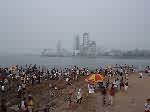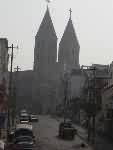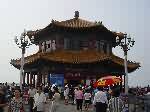- Getting around Lijiang. Dont stay in the Old Towns more than 2 days, there is nothing to do. KRISS Oct 9, 2013 05:46
- 2013 Beijing Temple Fair BENNYLAU Feb 26, 2013 03:29
- Malaysian traveling from KUL - LAX vis Shanghai PVG ZATI_DY Jan 3, 2013 20:15
An Unconventional Route Part One - Skipping the Bohai Gulf
- Views: 2772
- |Vote: 0 0
- |Add to Favorites
- |Recommend to Friends
Creative Travel in China's Peak Season
When you're travelling, probably the last thing you want to hear is that there are no tickets to the place where you want to go. It's a common phenomenon in China. It's not only the peak travel seasons that are affected: anywhere, at any time and any place, you can be stuck without a convenient train or a bus, and the usual alternative is a standing ticket on some very long and slow train that goes via everywhere else first.
In the capital, it's particularly bad if you want to take an overnight train to anywhere in hard sleeper class. Tickets for most services go on sale at 7.00pm three days ahead of departure, and I've been at the station, right at the ticket counter, dead on seven, three days early, and all the hard berth tickets for anywhere are sold out. Sometimes you can only get tickets from the agencies that have some back-door method of buying out these tickets in advance and selling them at a mark-up.
For clever travellers, however, salvation lies in having good geography and creative methods. There have been times for me when, for lack of more direct and obvious alternatives, I've had to plan some fairly unconventional routes. At times they have worked seamlessly, at times the gamble flops: but it's always interesting.
I was in Dalian City in Liaoning trying to get to Changsha in the middle of the country to see a good friend, Lao Hei, who was leaving China in a week. It was the beginning of a national holiday, a time that signals death for habitual travellers. It's almost impossible to get to anywhere from anywhere as these are the times when the entire population of China seems to be squeezing itself into those long green train tubes and hitting the rails. I'd had just a day's warning and already it was impossible to take the regular route: a train to Beijing and then another from there to Changsha in Hunan province. After a few phone calls and a trip to the station, I discovered that every possible train was booked solid, and that a plane would be prohibitively expensive. The only place to turn to was the map of China on my bedroom wall.
Dalian is right on the tip of the Liaodong Peninsula reaching protectively around the Bohai Gulf. The northern tip of Shandong province is a very short boat ride away, and I theorised that if I could catch a ferry to the nearby city of Yantai, and then cross Shandong province by land somehow, I would be most of the way there already.
I had a good friend from Shandong and so checked with him: he told me that I could get a night ferry to Yantai and a bus from there to Qingdao, the famously beautiful port city in the South of Shandong. From there I could take a direct train to Changsha – beating the tourists who'd all bought train tickets ahead of me there by half a day.
The Crossing
Within a few hours I was on board a handsome vessel bound for Yantai. I had a bed ticket, but didn't anticipate getting much sleep as the ferry left at 9.30pm to arrive at 3.00am – possibly the least convenient time to schedule a sailing I could imagine. I stood on the top deck of the boat watching as we pulled away from Dalian – through the mists on the black sea waters I could make out the shapes of Dalian's attractive towers, all immaculately designed to match the city's image as the most beautiful city in Northern China. As we drifted out into the open sea, I watched as the gray shapes of the irregular coastlands fell into the fog and the night quietened to a hush of tide. We sailed on into the darkness and I watched the rocking of the waves against the bow as we inched away from the invisible shore.
Before long I went down to my cabin and rested for a while. I could hear the murmuring of fellow passengers nearby, and with the motion and the cheerful noise I could almost imagine I was back on a train on one of those all too familiar hard berths. The only difference was that the shuddering of track wheel on iron rail was replaced by the swaying of the massive hulk of the ship.
I must have drifted into sleep, because I became suddenly aware that the ship had stopped moving ahead, and the activity outside my cabin door was increasing rapidly. I dizzily bundled my gear and walked out into the cool air – a crowd of passengers were moving down the gangway into the darkness and onto the Yantai wharf. I followed them down and was soon wandering through a large yard, wondering where to go next. Within a few moments, however, drivers of nearby parked busses started calling out to the crowd: Qingdao! Jinan! Weihai! I wandered over to the nearest Qingdao bus and was pulled aboard eagerly, shoved to the back with all the bags and squeezed into a short row of seats.
Very quickly, we set out on the four hour journey. I watched the empty, amber-lit streets of Yantai as we passed, hating to leave a new city without exploring any of it at all. The lonely, tree-lined avenues were unmistakably China, side roads led away to unseen districts and the homes of unknown friends.
I'd not slept properly, and rested my head on the back of the seat in front of me. It wasn't comfortable, and the suspension of our vehicle was poor – I couldn't help but pass out, exhausted, but was frequently jolted awake by the movements of the bus, and treated to rare views of Shandong's farmlands in the morning half-light.
Foiled in Qingdao
We pulled into Qingdao at seven. I stepped out of the bus on a rise and immediately purchased a map, and identified that I was a short public bus ride away from the sea. I found the bus stop quickly and set off through the Qingdao suburbs.
My Dalian friend had arranged for me to meet his classmate later that morning, whom he had asked to book a train ticket to Changsha in advance for me leaving at eleven o'clock. It gave me only a couple of hours to see as much of Qingdao as I could, and I gathered the last reserves of energy I had left to keep pushing onwards.
Qingdao is one of China's better-known cities. Formerly a German colony, it has inherited a Teutonic architecture and a world-famous beer tradition. Qingdao Beer (usually spelt Tsingtao Beer in accordance with a formerly standard method, but pronounced the same as the pinyin) is sold worldwide, and is popularly regarded as one of the country's best. From the bus windows, I was disappointed with the outskirts of Qingdao, which seemed old and tired, but the closer I got to the seashore the more rapidly the scenery changed. From the top of the slope going down to the shoreline, upon which stands the impressive twin-steepled St Michael's Cathedral, the incidence of colonial style historical buildings rises sharply and the new, modern looking Qingdao skyline comes into view. I got off near the seaside itself and was immediately taken by the smart look of the central city. Qingdao is at its most presentable looking towards the harbour from the sea, and it's worth going out on the boat for a wide-angle perspective. I didn't really have the time, so I let myself get away with a view from the end of the pier. Qingdao Pier is fascinating in itself: it is over 100 years old, and has an octagonal pavilion built at its end in the traditional style of a pagoda – its silhouette is on every label of Tsingtao Beer. I took the chance to inspect the exhibits inside and was disappointed to discover that it was a museum of pretty shells, unbecoming of its impressive exterior.
Time was catching up with me already, and so I hurried back to the KFC near the quaint, traditional European buildings making up the area of the train station. Waiting for me was a bright, enthusiastic Chinese woman with brightly dyed red hair called Maggie. We sat chatting for a short while before I asked how much I owed her for the tickets she'd purchased for me for the train departing shortly. She was most surprised: she had thought that her task was to accompany me to the train station to buy tickets for the following day!
It was upon this communication error that my speedy sideways trip to Changsha fell down. I explained what my plan had been and we rushed to the station to see if any tickets were available for the next train, but it was overly optimistic to imagine that this would be the case. We got a platform ticket and I asked the conductor of the train if it was possible to upgrade a ticket on the train itself, but he laughed – the train was unusually full. Maggie and I sullenly watched the train move slowly away on its journey to Changsha without me.
When the trains fail you, there's always the bus. A short trip to the bus station later, however, we discovered that bus options to Changsha were even worse. Once again, I turned to the map.
There was one bus that seemed to be going in the right general direction – a bus to Hefei, capital of Anhui province, which on the map is approximately halfway to Changsha. I'd never been there, and had no idea what the availability of transport from Hefei to Changsha would be like – but it was better than waiting another whole day in Qingdao while my time was running out. I got the ticket and within half an hour was back on the road, leaving Qingdao behind me as an enticing prospect for a second visit another time.






 Copyright © 1998-2026 All rights reserved.
Copyright © 1998-2026 All rights reserved.
1.
Sep 29, 2005 04:14 Reply
CONNY129 said:
travel for travel itself